Projects
at a Glance
Selected Projects
Twenty Years of Urban Growth: Implications for air quality and environmental justice in the GTHA - School of Cities Urban Challenge Grant (2025-26): Inequality, data, and democracy
This project aims to investigate how the past two decades of urban growth have shaped disparities in the distribution of urban environmental stressors and environmental justice (EJ) across the Greater Toronto and Hamilton Area (GTHA). This research is particularly important in rapidly growing areas, such as the GTHA, to ensure that areas grow equitably without exacerbating existing disparities in the distribution of environmental burdens. Through this project, we will offer a unique approach to conducting EJ analyses by combining historical data on urban environmental stressors (air pollution, access to green space, and urban heat exposure), urban growth (construction data and building permits) and socioeconomic status. This combination of datasets aims to capture how the rapid urban growth in the GTHA has impacted the trends and spatial patterns of air pollution, access to green space, and urban heat, as well as the trends and spatial distribution of socioeconomic characteristics. To maximize the impact of our project, we will integrate our findings into HealthyPlan.City, a web-based visualization platform developed by CANUE, offering free, accessible data for diverse stakeholders. This democratized access to data aims to facilitate equitable and just urban transitions.
The Road to Net Zero
Project Summary
Due to socioeconomic shifts and the need to achieve deep cuts in greenhouse gas (GHG) emissions, Canada will experience an unprecedented transformation in its transportation infrastructure. The implications of such changes on the movement of people and goods are not well-characterized, hindering the ability to direct them towards maximum climate benefits while minimizing societal costs. Using the Greater Toronto and Hamilton Area as a testbed, this project will address knowledge gaps in the quantification of emissions associated with individual mobility choices, with particular emphasis on the transport infrastructure investments that can achieve the highest shifts in travel behaviour, reduce GHG emissions, while improving air quality, public health, and equity.
Research Objectives
Objective 1: Improve the characterization of current and future travel choices in the GTHA, with emphasis on public transit, active transportation, and parks versus parking;
Objective 2: Improve transportation emission inventories (reporting and tracking) for greenhouse gases (GHG) and air pollutants;
Objective 3: Develop analytical tools to characterize and visualize patterns in community level air pollution, public health, and equity in relation to transportation infrastructure and green space;
Objective 4: Model human behavior, GHG emissions, and co-benefits of decarbonization scenarios;
Objective 5: Generate novel community-level data on human behaviour, emissions, and air quality/health impacts of case studies to refine the analytics and utilize the experience to develop best practices for community engagement and participatory data.
Embedding social disadvantage within the research design
Various studies have established connections between transportation and equity, or air quality and environmental justice, and more recently between climate change and justice. However, less attention has been paid to the equity and justice implications of climate change mitigation action. Particularly in the transportation sector, different decarbonization initiatives can enable differential community outcomes by gender, socioeconomic status, race/ethnicity. For example, electric vehicle (EV) subsidies and a low carbon energy grid can achieve deep reductions in GHG emissions but generate unequal improvements in air quality between communities by providing clean mobility to the few who can afford EVs, or leaving communities with low car ownership mobility poor. Our project specifically focuses on the distribution of the co-benefits of transport decarbonization initiatives across communities in the GTHA. We examine how reductions in GHG emissions can improve mobility and enable maximum air quality, health, and social benefits in disadvantaged communities.
Selected Projects
- “Fifteen years of community exposure to heavy-duty emissions: Capturing disparities over space and time”
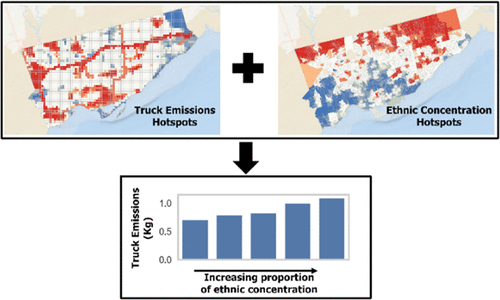
- “Short-Term Transportation Policy Levers: Evaluating Their Effects on Air Quality, Equity and Accessibility in the Greater Toronto and Hamilton Area (GTHA)”
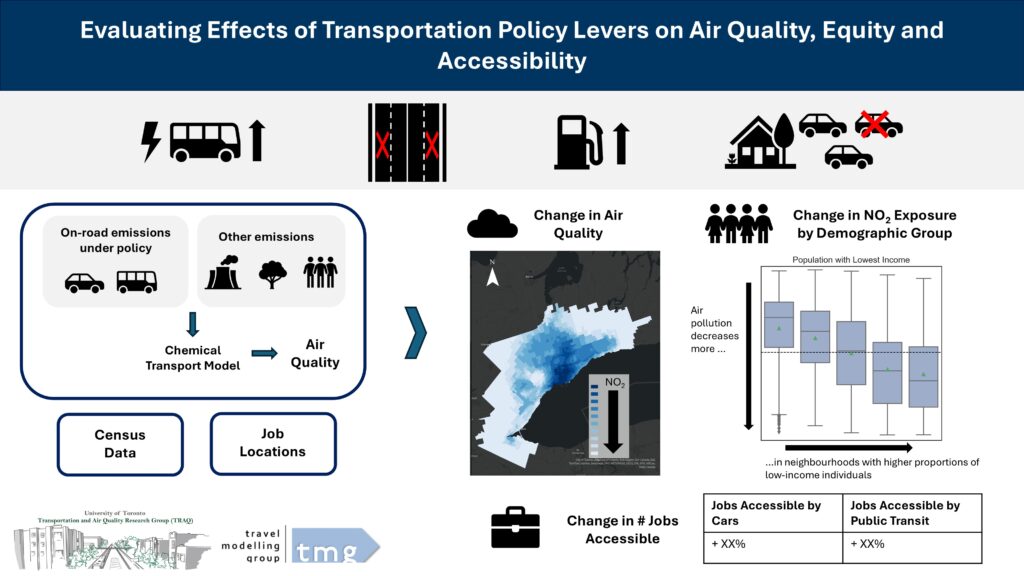
Bathurst Quay Neighborhood Air Quality Study
Research Objectives
Evaluation on the impacts of transportation-related emissions from Billy Bishop airport and nearby highway on air pollution in local communities
Partnerships
Academic partners: Prof. M. Hatzopoulou, Prof. G. Evans, Prof. J. Brook, Prof. J. Siegel, and Prof. A. Chan from the University of Toronto
Project partners: Bathurst Quay Neighborhood Association, City of Toronto, Toronto Public Health, Ports Toronto
Funding Sources
NSERC Alliance grant
Trainees
Emily Farrar, Weaam Jaafar, Junshi Xu, etc.

Air Quality Coordination for Construction Hubs
Research Objectives
Understand the impact of construction activities and machinery on air emissions and air quality ; Engage with the local community and assess exposure of residents at representative homes
Partnerships
Academic partners: Southern Ontario Centre for Atmospheric Aerosol Research (SOCAAR), Transportation and Air Quality Research Group (TRAQ) and Prof. J. Brook from the University of Toronto
Project partners: City of Toronto
Funding Sources
City of Toronto
Trainees
Weaam Jaafar, Emily Farrar, Junshi Xu, etc.

Modelling of Air Quality in a Rural Area of Unconventional Oil and Gas Development for Health and Justice
Research Objectives
Generate modelled air pollution concentrations to study the impact of hydraulic fracturing on rural communities in northeastern British Columbia, Canada
Partnerships
Academic partners:
Prof. M. Hatzopoulou and Prof. H. MacLean at the University of Toronto
Prof. Élyse Caron-Beaudoin at the From Bench to Communities Lab at University of Toronto Scarborough
Funding Sources
- XSeed Program Grant, University of Toronto
- Catalyst Grant, Data Sciences Institute, University of Toronto
Trainees
Miranda Doris, Jad Zalzal
Decarbonizing the University of Toronto Community
Research Objectives
Decarbonizing the University of Toronto community: How can we enable more sustainable and equitable personal choices across the three campuses?
Partnerships
Academic partners: Investigators from three UofT initiatives (Mobility Network, Positive Zero, and Mobilizing Justice) and three UofT campuses (St. George, Mississauga, and Scarborough)
Funding Sources
Climate Positive Energy and Climate Positive Campus
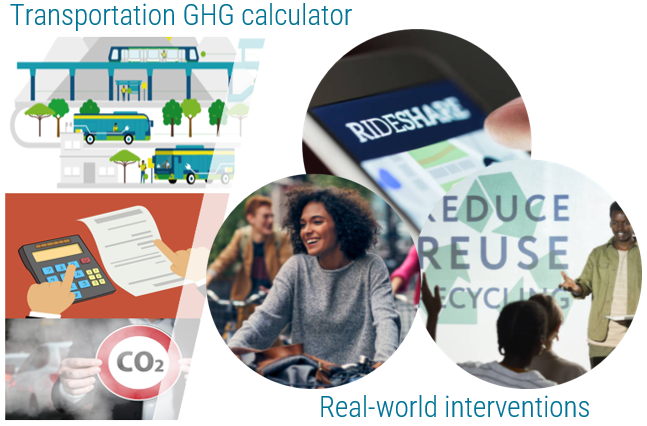
Urban Scanner Project
Research Objectives
Urban Scanner is an integrated platform that provides high-resolution spatiotemporal air quality information within urban environments. It collects and combines a variety of information such as air pollution concentration, a 3D map of the city, traffic conditions, micro-weather patterns, etc.
Partnerships
Project partners: Scentroid Inc.
Funding Sources
Natural Sciences and Research Council of Canada (NSERC) Engage Grant, Health Effects Institute (HEI) grant
Trainees
Junshi Xu, Arman Ganji, Mingqian Zhang, Keni Mallinen, An Wang, etc.
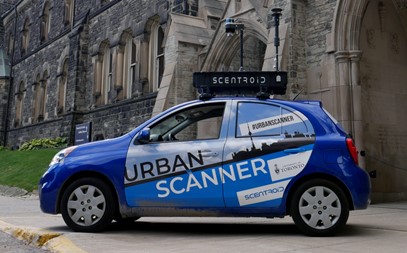
Traffic Emission Prediction Scheme (TEPS)
Research Objectives
Predicting road traffic volume and on-road emissions in urban areas, using traffic count data to predict periodic and annual volumes as well as GHG emissions at the level of each roadway for various years
Partnerships
Academic partners: Transportation and Air Quality Research Group (TRAQ) from the University of Toronto
Principal Investigators
Dr. A. Ganji (Senior Research Associate) and Prof. M. Hatzopoulou
Website
https://teps.ca/
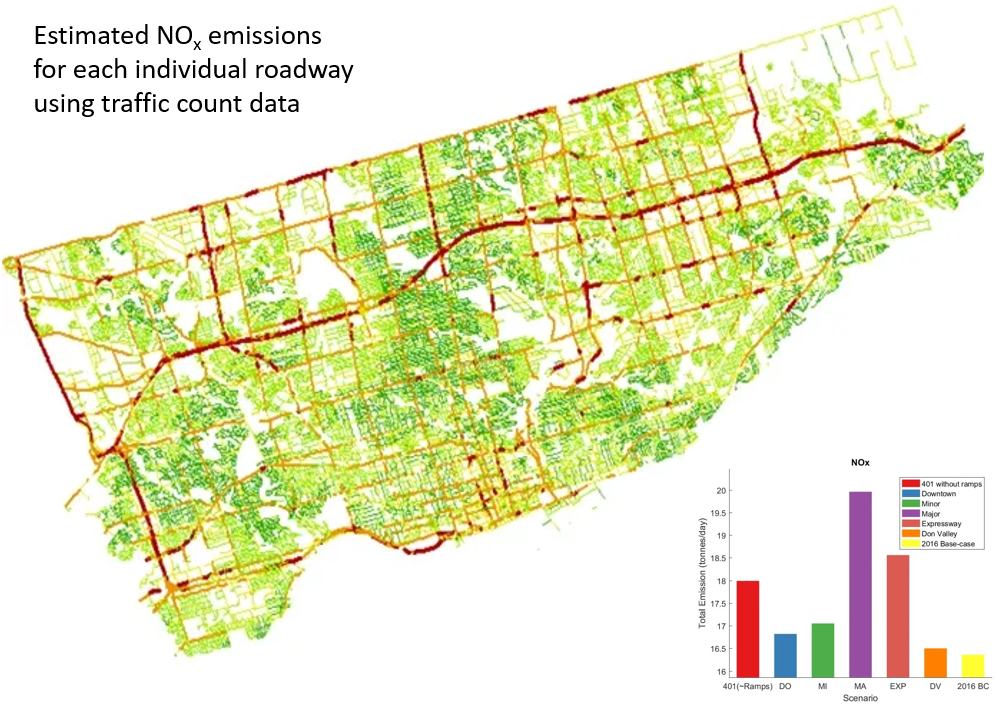
Assessing the Air Quality Benefits of Freight Fleet Electrification
Research Objectives
Model the reduced greenhouse gas (GHG) and air pollutant emissions and related population exposure that might be achieved through increased adoption of zero emission trucks to carry commercial goods in the Greater Toronto Hamilton Region (GTHA).
Partnerships
Project partners: Transportation and Air Quality Research Group (TRAQ) from the University of Toronto; Environment and Climate Change Canada (ECCC)
Funding Sources
ECCC
Trainees
Sara Torbatian

Air Quality and Health Impacts of Freight Trucks
Research Objectives
Investigation on the effects of diesel commercial vehicles on air quality and population health and the social benefits of greening freight movements
Partnerships
Academic partners: Prof. M. Hatzopoulou, Prof. M. Roorda, and Prof. D. Posen from the University of Toronto
Funding Sources
Natural Sciences and Research Council of Canada (NSERC) Discovery Accelerator grant
Trainees
Laura Minet

Health Impacts of Greenhouse Gas Reduction
Research Objectives
Development of a framework of estimating the impacts of greenhouse gas reduction on population health in Quebec
Partnerships
Project partners: Transportation and Air Quality Research Group (TRAQ) from the University of Toronto; Prof. A. Smargiassi from the University of Montreal
Project partners: Ministère de l’Environnement et de la Lutte contre les changements climatiques (MELCC)
Funding Sources
MELCC
Trainees
Shayamila Gamage, Sara Torbatian, Arman Ganji, Jad Zalal, Shoma Yamanouchi, Liu Ying, etc.

